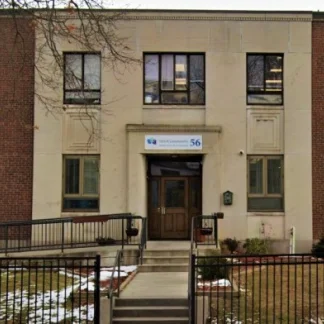Saint Francis Care Behavioral Health
Saint Francis Care Behavioral Health is a private rehab located in Hartford, Con...
InterCommunity- Recovery House, located in Hartford, Connecticut, is a drug and alcohol addiction treatment center that provides accessible and high quality care to people who are seeking to recover from the effects of addictive disorders.
InterCommunity- Recovery House offers detox, residential, outpatient services, and medication assisted treatment.
The detox program at InterCommunity Recovery House is a 35 bed medically monitored detox program for adults that is open for admissions every day of the year. This program helps clients experience a safe and effective detox process through the use of medications and the professional care of medical professionals.
The residential programs at InterCommunity Recovery House are offered in an intensive or intermediate intensity. They also have a program for substance abusing pregnant women and for those with children ages five and under. Residential treatment is best suited for those who have a high level of need in the beginning phase of their recovery. 24 hour supervision and staff are available. Traditional treatment methods such as individual therapy, group therapy, and medication assisted treatment are offered.
Intensive outpatient treatment runs three days per week and is offered during morning and evening hours. This program is for those who do not need a high level of accountability and who can participate in their normal day to day functioning while undergoing treatment.
Medication Assisted Treatment provides medications along with comprehensive medical, psychiatric, and behavioral counseling. FDA approved medications are used to support withdrawal from opioid drugs and to help maintain long term abstinence. By combining medication with mental health treatment, a greater chance of success is achieved for long term abstinence.
Individual therapy creates the space to explore the psychological challenges associated with addiction. With the help of a professional, individuals are given the space and direction to talk about and process their emotions. Often this includes unresolved trauma, anger, depression, anxiety, and the need for more control or autonomy in life.
Contact us for more information: (860) 714-3705

Connect with InterCommunity - Recovery House by calling their admissions team directly.
(860) 714-3705 Website Get DirectionsCognitive Behavioral Therapy (CBT) is a therapy modality that focuses on the relationship between one's thoughts, feelings, and behaviors. It is used to establish and allow for healthy responses to thoughts and feelings (instead of unhealthy responses, like using drugs or alcohol). CBT has been proven effective for recovering addicts of all kinds, and is used to strengthen a patient's own self-awareness and ability to self-regulate. CBT allows individuals to monitor their own emotional state, become more adept at communicating with others, and manage stress without needing to engage in substance abuse.
Group therapy is any therapeutic work that happens in a group (not one-on-one). There are a number of different group therapy modalities, including support groups, experiential therapy, psycho-education, and more. Group therapy involves treatment as well as processing interaction between group members.
In individual therapy, a patient meets one-on-one with a trained psychologist or counselor. Therapy is a pivotal part of effective substance abuse treatment, as it often covers root causes of addiction, including challenges faced by the patient in their social, family, and work/school life.
Life skills trainings involve all the skills a person must have in order to function successfully in the world. These include time management, career guidance, money management, and effective communication. Truly successful addiction recovery is based on the ability to not only live substance-free, but to thrive. Life skills teaches the practical necessities of functioning in society, which sets clients up for success in life, and therefore sobriety.
Group therapy is any therapeutic work that happens in a group (not one-on-one). There are a number of different group therapy modalities, including support groups, experiential therapy, psycho-education, and more. Group therapy involves treatment as well as processing interaction between group members.
In individual therapy, a patient meets one-on-one with a trained psychologist or counselor. Therapy is a pivotal part of effective substance abuse treatment, as it often covers root causes of addiction, including challenges faced by the patient in their social, family, and work/school life.
Life skills trainings involve all the skills a person must have in order to function successfully in the world. These include time management, career guidance, money management, and effective communication. Truly successful addiction recovery is based on the ability to not only live substance-free, but to thrive. Life skills teaches the practical necessities of functioning in society, which sets clients up for success in life, and therefore sobriety.
In individual therapy, a patient meets one-on-one with a trained psychologist or counselor. Therapy is a pivotal part of effective substance abuse treatment, as it often covers root causes of addiction, including challenges faced by the patient in their social, family, and work/school life.
Life skills trainings involve all the skills a person must have in order to function successfully in the world. These include time management, career guidance, money management, and effective communication. Truly successful addiction recovery is based on the ability to not only live substance-free, but to thrive. Life skills teaches the practical necessities of functioning in society, which sets clients up for success in life, and therefore sobriety.
Life skills trainings involve all the skills a person must have in order to function successfully in the world. These include time management, career guidance, money management, and effective communication. Truly successful addiction recovery is based on the ability to not only live substance-free, but to thrive. Life skills teaches the practical necessities of functioning in society, which sets clients up for success in life, and therefore sobriety.
Saint Francis Care Behavioral Health is a private rehab located in Hartford, Con...
InterCommunity provides mental healthcare, primary healthcare and addiction reco...
Hogar Crea Stowe Village Womens Center is a private rehab located in Hartford, C...
InterCommunity is a community health non-profit organization located in East Har...